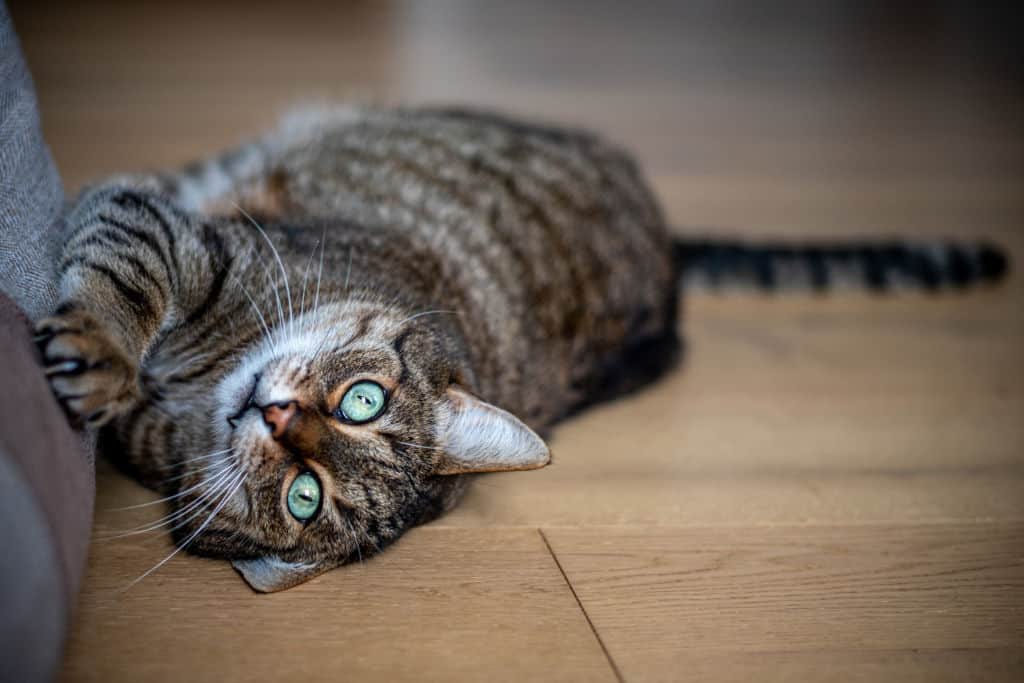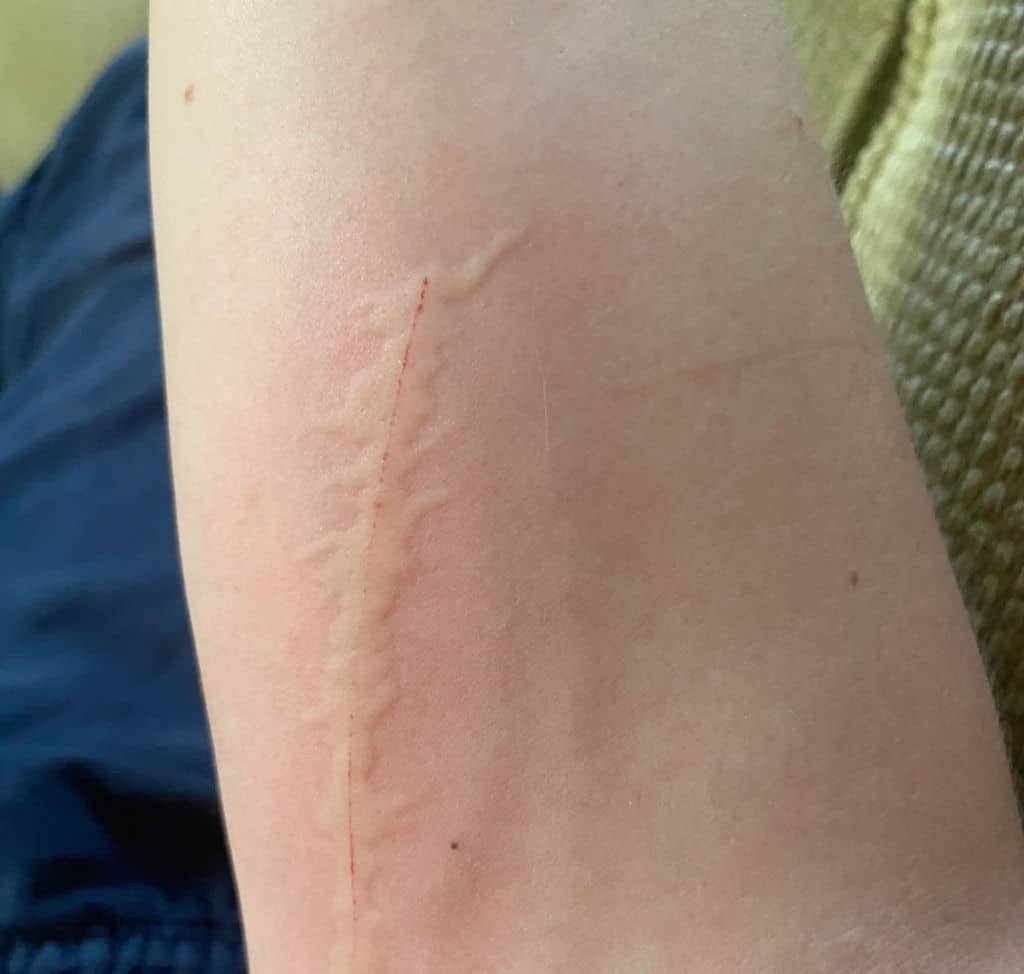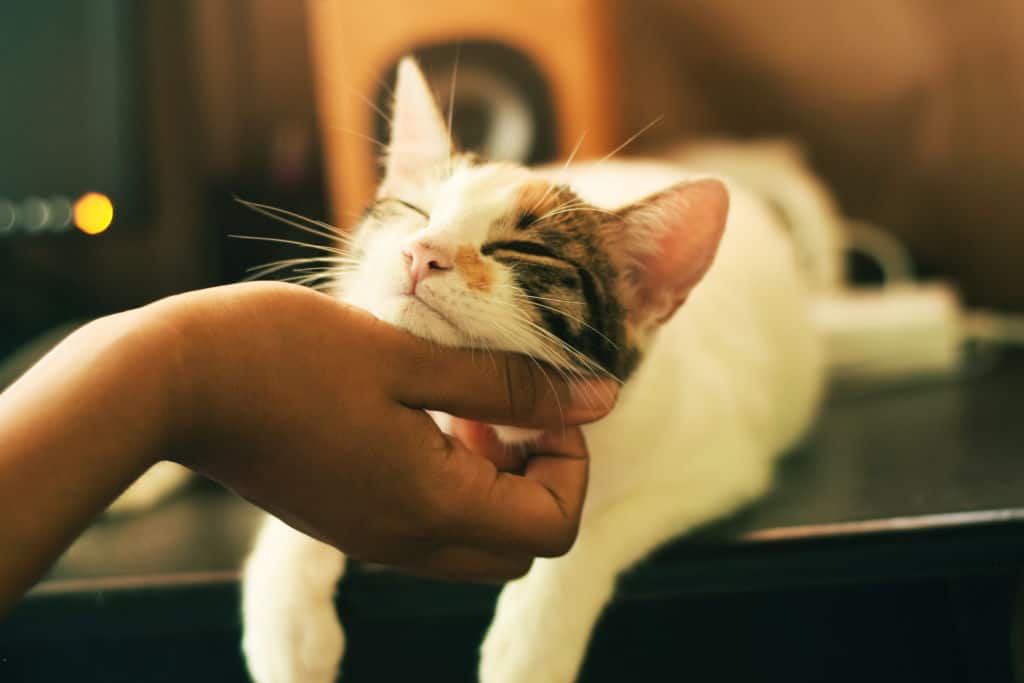Disclosure: We may earn a commission from helpful, relevant links in our content. No cost to you. See our privacy policy.
Some cat scratches can take a long to heal. Whether a cat scratch will leave a scar depends on many factors.
Usually, cat scratches don’t leave scars, but the type of scratch, your ability to heal, and how you treat the incident will be significant factors. You can only make sure to do whatever it takes for your skin to heal and keep an eye out for any lumps on your skin.
Something about the raggedness of the edges indicates that they usually heal nicely, but there are a few reasons why the scar may be permanent.

Do Cat Scratches Leave Marks?
A cat scratch may appear painful at first, but it will typically heal without leaving a scar. Usually, only deep scratches produce scars. Scars might fade over time or never fade at all. Some claim that moisturizing or using specific oils helps speed up the process.
If you keep the area clean and apply some ointments and vitamin E, it will fall off at the appropriate time and leave no scar.
If it’s a deep cut and infected, I recommend contacting a doctor as soon as possible for treatment to lessen the risks of scarring.
It depends on how deep it is, if you cleaned it right away, your age and whether you kept it out of the light. It’s unlikely that it will leave a scar, but skin heals less efficiently with age, and exposing new tissue to the light can result in a permanent scar.
Remember to never play with your cat with your bare hands. Petting them is fine, but playing is not. I use an item like a ribbon or something long to keep those paws at bay.
How Long Do Cat Scratches Stay On Your Skin?
A scratch will usually heal in under a week. Because of thinner or more sensitive skin, deeper scratches and those in specific places, such as the face, may take a little longer to heal. The same is true for older people with thinner or more sensitive skin.
The time it takes will be determined by several factors, such as the depth of the scratch, whether it caused an infection, and what skin type you have. Additionally, the weather plays a factor, as well as how much time you spend in the sun and do you apply vitamin E or take vitamin E supplements.
Everyone heals at a different rate. For example, if a person with diabetes gets scratched, it will take longer to mend. There is no standard time frame, although a bandage and medications may hasten to heal and reduce scarring.
Interestingly, the location of the scratch also plays a role. For instance, scratches on areas with more blood flow, like the face or hands, may heal faster due to the increased circulation.
I have a lot of raised red scratch marks like yours that don’t generally fade for months. Some from years ago transformed into faint scars, and some eventually went entirely, but I usually forget about them.
Why Do Cat Scratches Cause Itch and Swelling?
Usually, it’s merely a skin reaction, but you could also contract a disease. A bacterium found in cat saliva is the ailment known as cat scratch disease. The illness causes flu-like symptoms as well as redness and swelling at the site of a cat scratch. It’s crucial to immediately cleanse the area where the cat or kitten bit or scratched you with soap and water.

Cat scratches can develop infectious as well. However, if you clean the areas and apply a bandage and antiseptic ointment immediately, they should not become infected. Cat Scratch Fever is an uncommon disease you might contract, so keep looking for anything suspicious.
In a nutshell, scratches are rarely a problem if they are cleaned promptly. However, depending on the severity, you may need to go to the hospital, particularly if your immune system is damaged.
The only other thing to be aware of is that some cats carry Bartonella henselae bacterium, which they can transmit to you through scratching. It’s highly unusual and not dangerous in healthy people.
Sometimes, applying a cold compress to the scratch right after the incident can reduce swelling and potential scarring, giving your skin a better healing start.
You should consult a doctor if a lump forms unexpectedly, especially if it is hard and can be slid around. It could be an infection that requires medication or something more hazardous in the long run.
How Do You Prevent a Cat Scratch From Leaving a Scar?
A deep claw puncture should be cleaned and flushed with antiseptic before being bound with a bandage and a dab of ointment. Aloe vera and vitamin E are the most common ailments to prevent a cat scratch from scarring.
Wash it with soap and water before applying the medicine. Peroxide, Neosporin, or a triple antibiotic can prevent infections. Keep the area moist while allowing air to circulate.
Next to keeping it moist and covering it with a Band-Aid for a few days to keep the sun off, you could apply sunscreen until it all goes away. I would not conceal it with makeup or anything else. It would help if you waited for it to heal a little before covering it. Please wait for your skin to recover itself before using aloe vera gel.
Silicone sheets or gels (such as Kelo-cote) have been demonstrated to reduce the visibility of elevated keloid scars. You must apply it twice a day, every day, to see results.
A consistent sleep pattern can also positively affect the healing process. Our skin cells regenerate more quickly during sleep, so ensuring you get a good night’s rest can assist in faster recovery from a cat scratch.
There isn’t much you can do after this point because they’re no longer open wounds. Your skin just needs to heal slowly. Moisturize and apply sunscreen as needed. If it becomes red, puffy, and sore again, it is essential to seek professional help from a clinic or emergency room.

Getting get to like you and earning their trust is probably the most effective way of avoiding cat scars.
FAQs
Do cats realize they scratched you?
Cats are frequently oblivious to unintentional injuries they cause to others. While cats have sense in their claws, they don’t have a good enough feeling to know if they broke the skin, so I doubt they’d notice if they didn’t watch the injury.
Do you need a tetanus shot after a cat scratch?
You should get one if you haven’t had a tetanus booster in the last ten years. This scrape has a low danger, but you never know what else will happen to you, so getting the booster is worth it. There’s usually a low risk of tetanus, but if the scratch was from a stray cat, you might want to get a tetanus shot.
Why do cat scratches leave a bump?
Cat scratch fever (also known as cat scratch disease or CSD) is a bacterial infection caused by the bacterium Bartonella henselae. It produces swollen lymph nodes, skin lumps (bumps), and fever. They are usually harmless, but if it isn’t benign, they could grow lethal in a relatively short amount of time.
Can a cat scratch hurt a dog?
If it’s a feral cat, take your dog to the vet because there is a chance of infection, and there could be more injuries you’re unaware of. She may also require a rabies booster. However, if these are your house pets, it’s usually fine. Some bad symptoms include weeping, discoloration, sensitivity, and irritation.
Alex, a passionate animal lover, has experience in training and understanding animal behavior. As a proud pet parent to two dogs and three cats, he founded AnimalReport.net to share insights from animal experts and expand his knowledge of the animal kingdom.




